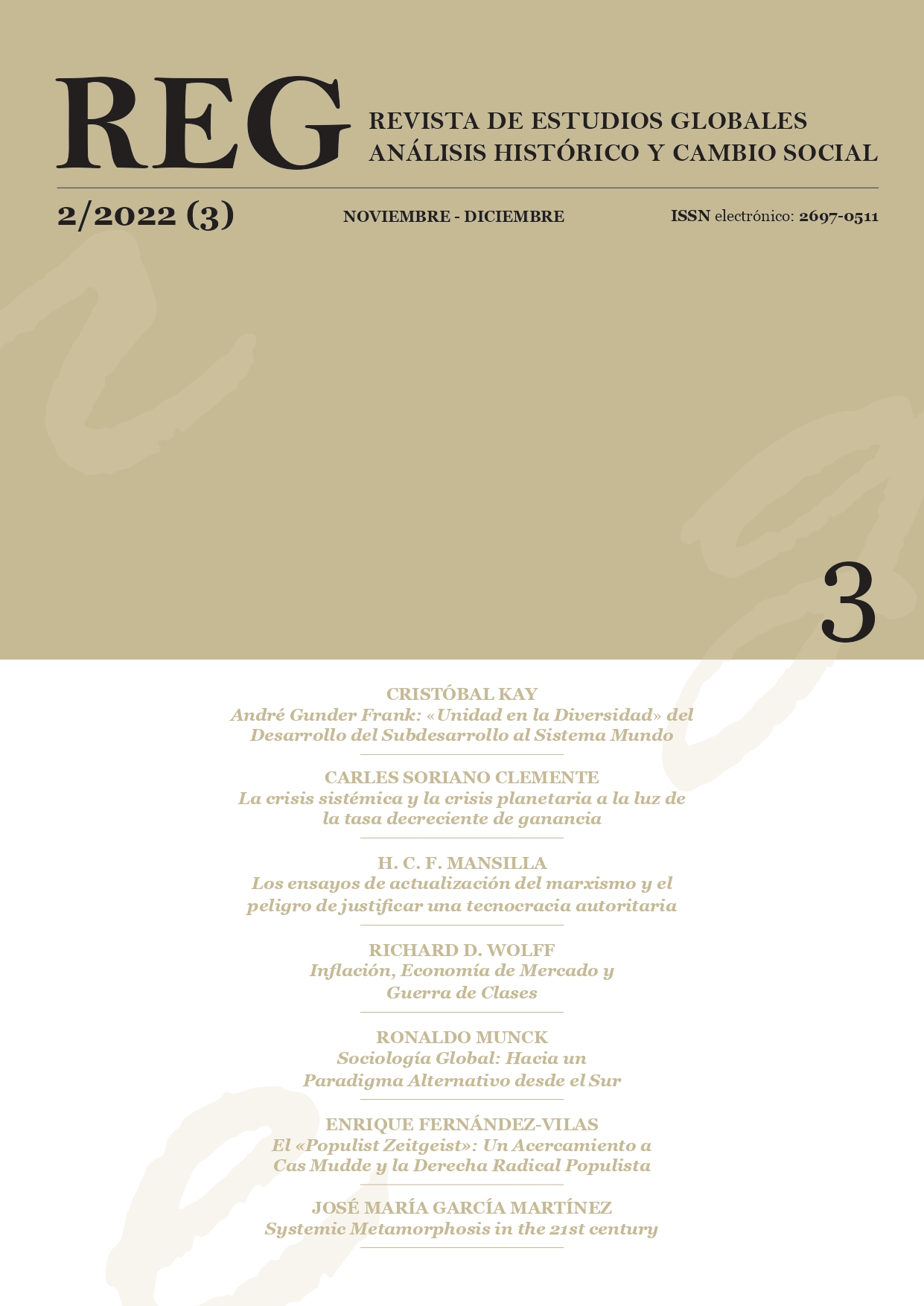Sociología Global: Hacia un Paradigma Alternativo desde el Sur
Resumen
En el proyecto para (re)construir una sociología global no hay un paradigma acordado, ni siquiera una comprensión compartida de las principales cuestiones que serían necesarias para lograr un nuevo modelo robusto y creíble. Lo que intentaré aquí es únicamente clarificar los términos del debate para determinar cómo deberíamos perseguir con convicción la búsqueda de este paradigma alternativo. En primer lugar, abordo la “gran cuestión” de una sociología global basada en los supuestos de la teoría de la globalización que, en general, adolece de economismo desde mi punto de vista. Posteriormente, presento una perspectiva postcolonial que plantea una división fundamental entre el Sur y el Norte global, una iniciativa que encuentro marcada por un cierto culturalismo. Adicionalmente, ofrezco elementos para un enfoque alternativo hacia un nuevo modelo basado en una comprensión de la complejidad, el desarrollo desigual y las políticas de escala. Una breve digresión latinoamericana al final del artículo tiene el propósito de realizar una aportación al debate general sobre una nueva sociología global que podría desarrollarse a través de una perspectiva crítica desde el Sur y un enfoque en la economía política cultural.
Descargas
Métricas
-
Resumen554
-
pdf212
Citas
Acosta, A. (2010), «El buen vivir en el camino del post–desarrollo», Friederich Ebert Stiftung, Policy Paper No. 9.
Albrow, M. (1996), The global age: State and society beyond modernity, Cambridge: Polity Press.
Althusser, L., & Balibar, E. (1970), Reading capital, London: Verso.
Arrighi, G., Silver, B., & Brewer, B. (2003), «Industrial convergence, globalization, and the persistence of the north–south divide», Studies in Comparative International Development, 38 (1), pp. 3–31.
Aschroft, B., Griffiths, G., & Tiffin, H. (Eds.) (1995), The post–colonial studies reader, London: Routledge.
Balibar, E. (1995), The philosophy of Marx, London: Verso.
Bartra, R. (2002), Blood, ink and culture: Miseries and splendors of the post–mexican political condition, Durham, NC: Duke University Press.
Benjamin, W. (1969), Illuminations, NY: Harcourt Brace Jovanovich.
Best, J., & Paterson, M. (Eds.) (2010), Cultural political economy, New York: Routledge.
Bhambra, G. (2007), «Sociology and postcolonialism: Another ‘missing’ revolution?» Sociology, 4 (5), pp. 871–884.
Bhambra, G. (2014), Connected sociologies, Bloomsbury Academic.
Bieler, A., Lindberg, I., & Pillay, D. (Eds.) (2008), Labour and the challenges of globalization, London: Pluto.
Bisley, N. (2007), Rethinking globalization, Houndmills: Palgrave Macmillan.
Burawoy, M. (2008), «Rejoinder: For a subaltern sociology», Current Sociology, 56 (3), pp. 435–444.
Calderón, F., Hopenhayn, M., & Ottone, E. (1996), Esa esquiva modernidad: Desarrollo, ciudadanía y cultura en América Latina y el Caribe, Caracas: Nueva Sociedad.
Canclini, N. G. (1995), Hybrid cultures: Strategies for entering and leaving modernity, Minneapolis: University Minnesota Press.
Canclini, N. G. (2002), Latinoamericanos buscando lugar en este siglo, Buenos Aires: Paidós.
Cardoso, F. H., & Faletto, E. (1969), Dependencia y desarrollo en América Latina, Mexico: Siglo XXI.
Cardoso, F. H., & Faletto, E. (1979), Dependency and development in Latin America, Berkeley: University of California Press.
Castells, M. (1996), The information age–Volume I: The rise of network society, Oxford: Blackwell.
Castells, M. (1997), The information age–Volume II: The power of identity, Oxford: Blackwell.
Chandhoke, N. (2005), «How global is global civil society?» Journal of World Systems Research, 11 (2), pp. 355–371.
Chernilo, D. (2011), «The critique of methodological nationalism: Theory and history», Thesis Eleven, 106 (1), pp. 98–117.
Coates, D. (2005), Varieties of capitalism: Varieties of approaches, London: Palgrave Macmillan.
Cohen, R., & Kennedy, P. (2000), Global sociology, Houndmills: Palgrave Macmillan.
Cohen, R., & Kennedy, P. (2013), Global sociology (3rd ed.), Houndmills: Palgrave Macmillan.
Connell, R. (2007), Southern theory. The global dynamics of knowledge in social science, Cambridge: Polity Press.
Coronil, F. (2008), Elephants in the Americas? Latin American postcolonial studies and global decolonization, en M. Moraña, E. Dussel, & C. Jáuregui (Eds.), Coloniality at large: Latin America and the postcolonial debate (pp. 396–416). Durham: Duke University Press.
Day, R., & Gaido, D. (2009), Witnesses to permanent revolution, Chicago: Haymarket.
Delaney, D., & Leitner, H. (1997). The political construction of scale. Political Geography, 16 (2), pp. 93–97.
Drainville, A. (2004), Contesting globalisation: Space and place in the world economy, London: Routledge.
Eisenstadt, S. (2000), «Multiple modernities» Daedalus, 129 (1), pp. 1–29.
Escobar, A. (2010), Worlds and knowledges otherwise: The Latin American modernity /coloniality research program, en W. Mignolo & A. Escobar (Eds.), Globalization and the decolonial option (pp. 33–64). New York: Routledge.
Firebaugh, G. (2003), The new geography of global income inequality, Cambridge: Harvard University Press.
Friedman, T. (2005), The world is flat: A brief history of the twenty–first century, Farrar, Straus and Giroux.
Fukuyama, F. (1992), The end of history and the last man, New York: Free Press.
Gandhi, L. (1998), Postcolonial theory: A critical introduction, New York: Columbia University Press.
Ghemawat, P. (2007), «Why the world isn’t flat», Foreign Policy, March–April.
Gouldner, A. (1970), The coming crisis of western sociology, New York: Basic Books.
Gramsci, A. (1971), Selections from the prison notebooks, London: Lawrence and Wishart.
Grzanka, P. (2014), Intersectionality: A foundations and frontiers reader, Boulder: Westview Press.
Habermas, J. (1985), «A philosophical–political interview», New Left Review, I (15).
Hall, P., & Soskice, D. (2001), Varieties of capitalism: The institutional framework of comparative advantage, Oxford: Oxford University Press.
Hart, G. (2002), Disabling globalization: Places of power in post–apartheid South Africa, Berkeley: University of California Press.
Herod, A. (2001), Labor geographies: Workers and the landscapes of capitalism, New York: The Guilford Press.
Jessop, B., & Sum, N. L. (2010), «Pre–disciplinary and post–disciplinary perspectives», New Political Economy, 6 (1), pp. 89–101.
Kapoor, I. (2008), The postcolonial politics of development, London: Routledge.
Kay, C. (1989), Latin American theories of development and underdevelopment, London: Macmillan.
Lutz, H., Vivar, M. T. H., & Supik, L. (2011), Framing intersectionality: Debates on a multi–faceted concept in gender studies, Farnham: Ashgate.
McEwan, C. (2009), Postcolonialism and development, London: Routledge.
Mezzadra, S. (2011), «How many histories of labour? Towards a theory of postcolonial capitalism», Postcolonial Studies, 14 (2), pp. 151–170.
Mignolo, W., & Escobar, A. (Eds.) (2010), Globalization and the decolonial option, London: Routledge.
Milanović, B. (2011), Global inequality: From class to location, from proletarians to migrants.
Policy Research Working Paper 5820. Poverty and Inequality Team: The World Bank.
Moore, A. (2008), «Rethinking scale as a geographical category: From analysis to practice», Progress in Human Geography, 32 (2), pp. 203–225.
Munck, R. (1999), Labour in the global: Challenges and prospects, en R. Cohen & S. Rai (Eds.), Social movements in the global age (pp. 83–100), London: Athlone Press.
Munck, R. (2002), Labour and globalisation: A new great transformation?, London: Zed Book.
Munck, R. (2006), «Global civil society: Royal road or slippery path», VOLUNTAS: International Journal of Voluntary and Nonprofit Organizations, 17, pp. 325–332.
Munck, R. (2007), Globalization and contestation: The new great counter–movement, London: Palgrave.
Munck, R. (2013a), Rethinking Latin America: Development, hegemony and social transformation, New York: Palgrave Macmillan.
Munck, R. (2013b), «The precariat: A view from the South», Third World Quarterly, 34(5), pp. 747–762.
Patel, S. (Ed.) (2010), The ISA handbook of diverse sociological traditions, London: Sage Publications.
Patel, S. (Ed.) (2014), «Afterword: Doing global sociology: Issues, problems and challenges», Current Sociology, 62 (4), pp. 603–613.
Phillips, A. (1992), Universal pretensions in political thought, en M. Barrett & A. Phillips (Eds.), Destabilizing theory: Contemporary feminist debates, Cambridge: Polity Press.
Quijano, A. (2008), Coloniality of power, eurocentrism and social classification, en M. Moraña, E. Dussel, & C. Jáuregui (Eds.), Coloniality at large: Latin America and the postcolonial debate (pp. 181–224). Durham: Duke University Press.
Radcliffe, S. (2011), «Development for a postneoliberal era? Sumak kawsay, living well and the limits to decolonization in Ecuador», Geoforum, 43 (2), pp. 240–249.
Ramirez, R. (2010), Socialismo del sumak kawsay o biosocialismo republicano. En Los nuevos retos de América Latina: Socialismo y Sumak Kawsay, Quito: SENPLADES.
Reed, I. A. (2013), Theoretical labors necessary for a global sociology: Critique of Raewyn Connell’s Southern Theory, en J. Go (Ed.), Decentering social theory (pp. 157–171). Bingley: Emerald Group Publishing Limited.
Reigadas, M. C. (1998), Neomodernidad y posmodernidad: Preguntando desde América Latina, en E. Marí (Ed.), Posmodernidad, Biblio Editores: Buenos Aires.
Robinson, W. (2011), Globalization and the sociology of Immanuel Wallerstein: A critical appraisal,
International Sociology, 26 (6), pp. 723–745.
Romero, M., & Margolis, E. (Eds.) (2005), The Blackwell companion on social inequalities, Oxford: Blackwell.
Said, E. (2002), A conversation with Neeladri Bhattacharya, Suvir Kaul, and Ania Loomba, en T. Goldberg & A. Quayson (Eds.), Relocating postcolonialism (pp. 1–14). Oxford: Blackwell.
Schmidt, V. (2006), «Multiple modernities or varieties of modernity?», Current Sociology, 54 (1), pp. 77–97.
Silver, B. (2003), Forces of labor: Workers’ movements and globalization since 1870, Cambridge: Cambridge University Press.
Sklair, L. (2001), Globalization: Capitalism and its alternatives, Oxford: Oxford University Press.
Sklair, L. (2002), Sociology of the global system, Harvester: Hemel Hempstead.
Smart, B. (2003), Economy, culture, and society: A sociological critique of neoliberalism, Buckingham: Open University Press.
Smith, N. (1984), Uneven development: Nature, capital and the production of space, Oxford: Basil Blackwell.
Stevis, D., & Boswell, T. (2008), Globalization and labor: Democratizing global governance, Lanham: Rowman and Littlefield.
Stiglitz, J. (2006), Making globalization work, New York: Norton.
Sum, N. G., & Jessop, B. (2014), Towards a cultural political economy, London: Edward Elgar.
Therborn, G. (1976), Science, class and society: On the formation of sociology and historical materialism, London: Verso.
Urry, J. (2003), Global complexity, Cambridge: Polity.
Wallerstein, I. (1979), The capitalist world–economy, Cambridge: Cambridge University Press.
Wallerstein, I. (1996), Open the social sciences. Report of the Gulbenkian Commission on the Restructuring of the Social Sciences, Stanford: Stanford University Press.
Wallerstein, I. (2004), World–systems analysis: An introduction, Durham: Duke University Press.
Webster, E., Lambert, R., & Bezuidenhout, A. (2008), Grounding globalization: Labour in the age of insecurity, Oxford: Blackwell.
Williams, P., & Chrisman, L. (Eds.) (1994), Colonial discourse and post–colonial theory: A reader, New York: Columbia University Press.
Wimmer, A., & Schiller, G. (2002), Methodological nationalism and beyond: Nation–state building, migration and the social sciences. Global Networks, 2 (4), pp. 301–334.
World Bank. (2000), World development report 2000–2001: Attacking poverty. Washington DC: World Bank.
Derechos de autor 2023 Revista de Estudios Globales. Análisis Histórico y Cambio Social

Esta obra está bajo una licencia internacional Creative Commons Atribución-NoComercial-SinDerivadas 4.0.










